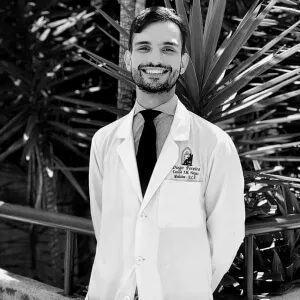Christmas: A Cardiovascular Risk Factor?


Written and verified by the doctor Diego Pereira
A wide variety of studies have associated Christmas with increased cardiovascular risk. In particular, it has been observed that during these dates there is a higher incidence of fatal events, such as heart attacks and cerebrovascular disease. But why is this?
In reality, there are several reasons for this. However, most of the time, it’s possible to take measures to avoid it. So, how can you enjoy the holidays responsibly? In the following article, we’ll share some recommendations.
Why is Christmas a cardiovascular risk factor?
Whether or not Christmas is a cardiovascular risk factor depends largely on a person’s habits. However, there are also other situations that play a role, such as the cold, stress, and the delay in going to hospitals when faced with signs of health problems. Let’s take a closer look.
The winter cold
Heart attacks and other cardiovascular events are related to the obstruction of blood flow to a certain tissue. This makes it difficult to supply oxygen and nutrients for proper functioning, which can lead to cell death within minutes.
This obstructive phenomenon is often influenced by several factors. One of them is the degree of dilatation of the blood vessels, i.e. their diameter. This is not a static measure, since it can be modified by the smooth muscle around the arterioles and the elastic properties of the vessels.
Therefore, there’s less blood flow in a constricted vessel than in a dilated one. If there’s an obstruction, such as an atheromatous plaque, the risk of infarction is greatly increased.
In order to divert blood flow to more important organs, generalized arterial vasoconstriction occurs in cold environments. In addition, there’s usually a release of hormones such as adrenaline, which promotes an increase in blood pressure.
This could explain, in part, the increase in cardiovascular mortality in the coldest months of the year. According to this study published in the journal Circulation, this tends to be in regions less accustomed to this climate, such as the southern United States.

Dietary changes, alcohol, and smoking
It’s no surprise to anyone that Christmas is synonymous with lots of food. Depending on the country and family customs, dishes and beverages can vary greatly. However, as a general rule, the consumption of carbohydrates, sweets, and alcohol increases during the holidays.
During heavy meals, the incidence of myocardial infarction or angina pectoris in high-risk patients tends to increase. This may be related to the redistribution of blood flow throughout the body to the digestive tract to promote nutrient absorption.
When this happens, the blood supply to the heart through the coronary arteries may be diminished. If there’s an atheroma plaque of considerable size, the increased turbulence resulting from vasoconstriction could cause it to rupture. This can release small thrombi capable of interrupting circulation.
Alcohol and cigarette consumption are also other problems. According to this study published in 2015, a large number of patients who suffered a cardiovascular event reported alcohol and tobacco abuse in the 12 months prior to the incident.
In turn, tobacco consumption has a direct effect on arterial vasoconstriction, which can increase the risk of suffering any of these events in case of excesses.
Stress
Although the goal is always to enjoy and share good times with family, it doesn’t always turn out that way. Work worries, looking for the right gifts, organizing events, and gathering loved ones could become a real headache.
These situations can trigger emotional stress. This term refers to the set of changes within the body that occur in response to an internal or external event. The protagonists of this response are hormones and the nervous system.
The activation of the hypothalamus-pituitary-pituitary-adrenal gland axis and the vegetative nervous system leads to the release of various substances that have activity on the cardiovascular system. Adrenaline is one of the most representative of these substances.
It acts on the arterioles to favor their vasoconstriction, which is closely related to the occurrence of cardiovascular events. In addition, it promotes the release of fatty acids, coagulation, and increased heart rate (tachycardia).
Looking a little deeper into tachycardia, it may be a factor that accelerates the onset of heart attacks. As the heart is working more intensely, energy and oxygen requirements are greater. If this condition is maintained over time, the likelihood of injury increases considerably.
We think you may also enjoy reading this article: The 7 Best Fruits to Detox Your Body at Christmas
Not going to health centers in time
In a recent review article, the authors established the profile of patients who tend to take longer to go to hospitals during an acute coronary syndrome. This delay has a considerable influence on mortality, especially in the context of extensive infarctions requiring immediate coronary reperfusion.
Some of the factors that cause delays are as follows:
- Being an older woman.
- Having single or divorced marital status.
- Not having life insurance.
- Having a low socioeconomic status.
- Living alone.
In turn, according to the authors, this can occur at several levels. The first of these is the identification by patients of the characteristic signs and symptoms of acute coronary syndrome. The second concerns the request for help and transfer to a hospital.
Because Christmas is such an important time for many people, the delay can be considerable. When symptoms begin in the early hours of the morning, during a traditional dinner or in the context of any celebration, it can be difficult to call for help.
Hospital facilities generally operate at lower capacity during the holiday season. On rare occasions, the delay in care could also be due to this factor.

Who is at increased cardiovascular risk at Christmas?
Any patient with cardiovascular risk factors may suffer a cardiovascular event at Christmas. Most of them correspond to chronic diseases, and the prognosis can worsen if the indicated treatment is not followed.
Those who suffer from diabetes mellitus should take greater precautions. This is a group of metabolic disorders related to poor insulin production or mismanagement. Therefore, they should follow fairly strict diets and take care of their blood glucose levels.
Personal or family history of cardiovascular disease, such as systemic arterial hypertension, is also considered risk factor. In fact, according to this review article, the risk of suffering cerebrovascular disease (CVD) increases 3 to 4 times in patients with this pathology.
Obesity should also be taken into account. It is a chronic disease characterized by an increase in body mass index above 30 kg/m2, closely linked to genetic factors. Angina pectoris, myocardial infarction, arterial hypertension, and CVD are some of the consequences of suffering from this pathology.
Although a direct link between Chronic Obstructive Pulmonary Disease (COPD) and cardiovascular events has not been demonstrated, these patients usually have associated classic risk factors. Therefore, many of them, in addition to COPD, often have high blood pressure and obesity, which worsen their prognosis.
How to reduce cardiovascular risk at Christmas?
To reduce cardiovascular risk at Christmas, it’s advisable to maintain healthy habits, especially in terms of diet and exercise. Here are some tips.
Exercise
This issue should be handled with care, as it can be a double-edged sword. During Christmas, people with classic risk factors could suffer more frequently from these events if they exercise too much.
During this type of activity, both the release of hormones and tachycardia can provoke the onset of acute coronary syndrome. It’s advisable to consult a physician before starting an exercise plan for a person with a long-standing sedentary lifestyle.
Activities such as walking for at least 30 minutes a day and stretching exercises are generally allowed. Sports such as tennis, running, soccer, or just jogging may cause patients to overexert themselves.
This depends very much on age and other comorbidities. In any case, it’s advisable to start the activity gradually and before winter begins.

Diet
In general, copious and unhealthy meals should be avoided. The greatest risk is for diabetics, who should be careful not to commit excesses that could lead to suffering any of the acute complications of their disease.
To do this, it’s advisable to replace some traditional dishes with healthier options. Starters, for instance, instead of containing fried foods, could include soups or creams made with natural ingredients. In the case of main meals, it’s best to opt for fish, vegetables, and puree. Cheese is always a controversy for these patients, so we recommend you read this article to learn a little more about how much cheese a person can really eat.
Of course, this doesn’t mean that small bites of the main traditional meals can’t be tasted, unless there’s an explicit contraindication by your physician. In these cases, the most important thing is not to overdo it, especially late at night when it may be difficult to access health services.
In the case of beverages, it’s advisable to avoid alcohol. Although its occasional consumption isn’t usually associated with the occurrence of acute cardiovascular events, people with diabetes should avoid it. When consumed, it only provides “empty calories” with little or no nutritional value.
In the case of people with diabetes, it’s a good idea to have a glucometer at hand to measure blood glucose values in case of any physical discomfort. Sometimes, this simple habit can prevent many complications of the underlying disease.
Like this article? You may also like to read: Why You Should Take Milk Thistle After Christmas
Relaxation techniques
In order to avoid stress during these dates, the use of relaxation techniques is very relevant. Trying not to overload yourself with work, respecting work schedules, improving communication with loved ones, and sleeping the right hours are also small elements that, together, can make a big difference.
There are many relaxation techniques you can learn. Tai Chi, according to the Mayo Clinic, is one useful option. This is a non-competitive, low-intensity exercise modality whose origin goes back to ancient Chinese traditions.
Through stretching maneuvers, proper posture, and deep breathing, it’s possible to acquire certain health benefits. This could contribute to improving the quality of your sleep, promoting relaxation, and reducing anxiety.
In fact, some studies have postulated a possible relationship between its regular practice and the reduction of blood pressure. Other practical recommendations include getting a head start on Christmas shopping and planning all of your activities ahead of time.
Beware of the cold
For those who plan to spend these dates in a colder area than usual or who don;t tolerate this type of environment, it’s necessary to take into account certain things to prevent the occurrence of cardiovascular events, such as the following:
- Always w appropriate clothing (coat, socks, gloves, and hats).
- Avoid sudden changes in temperature when leaving and entering establishments.
- Repair any problems with heaters before winter comes along.
- Prioritize meetings at home over going out.
Christmas is a time of joy and celebration. Despite this, the incidence of cardiovascular events at this time of year has been clearly demonstrated. Following some basic recommendations could make the difference between excellent days and a hospital stay. If in doubt, consult your doctor.
All cited sources were thoroughly reviewed by our team to ensure their quality, reliability, currency, and validity. The bibliography of this article was considered reliable and of academic or scientific accuracy.
- Armstrong L, et al. Increases in Heart Failure visits after Christmas and New Year´day. Congestive Heart Failure 2008; 14 (6);307-309.
- González E, et al. Variaciones estacionales en los ingresos por infarto agudo de miocardio. El estudio PRIMVAC. Rev Esp Cardiol 2004;57(1):12-9.
- González J. Desencadenantes de síndromes coronarios agudos. Relaciones fisiopatológicas. Archivos de Cardiología de México 2006;76(2):208-221.
- Lobos J, et al. Factores de riesgo cardiovascular y atención primaria: evaluación e intervención. Aten Primaria 2011;43(12):668-677.
- Philips D, et al. Cardiac mortality is higher around Christmas and New Year´ than and any other time: The holidays as a risk factor of death. Circulation 2004;110:3781-3788.
- Vilà R, et al. Utilidad de las técnicas de relajación aplicadas a pacientes con cardiopatía isquémica: intervención. Aten Primaria 2005;36(2):78-84.
This text is provided for informational purposes only and does not replace consultation with a professional. If in doubt, consult your specialist.








